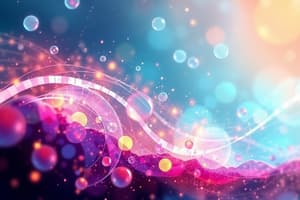Podcast
Questions and Answers
What is ion-exchange based on?
What is ion-exchange based on?
- Reversible exchange of ions between a solid and a liquid (correct)
- Irreversible exchange of ions between a solid and a liquid
- Formation of new ions in a liquid-solid interaction
- Complete change in the structure of the solid
What does ion chromatography rely on?
What does ion chromatography rely on?
- Formation of new ions during the chromatography process
- Equilibration of solute ions between the solvent and charged sites fixed on the stationary phase (correct)
- Complete change in the structure of the solvent
- Irreversible binding of solute ions to the stationary phase
What do anion exchangers contain?
What do anion exchangers contain?
- Non-covalently bound positively charged sites that bind solute cations
- Covalently bound positively charged sites that bind solute anions
- Covalently bound negatively charged sites that bind solute anions (correct)
- Non-covalently bound negatively charged sites that bind solute cations
What is exhaustion in the context of cation exchangers?
What is exhaustion in the context of cation exchangers?
How are polystyrene resins for ion exchange made?
How are polystyrene resins for ion exchange made?
What are polystyrene resins for ion exchange made of?
What are polystyrene resins for ion exchange made of?
What type of ion exchangers are commonly classified as strongly or weakly acidic or basic?
What type of ion exchangers are commonly classified as strongly or weakly acidic or basic?
What chemical groups can be present in weak base ion exchangers?
What chemical groups can be present in weak base ion exchangers?
What type of exchange resin contains sulfonate groups?
What type of exchange resin contains sulfonate groups?
What remains ionized even in strongly acidic solutions?
What remains ionized even in strongly acidic solutions?
Flashcards are hidden until you start studying
Study Notes
Ion Exchange
- Ion-exchange is based on the reversible interchange of ions between a solution and an ion-exchange material.
Ion Chromatography
- Ion chromatography relies on the ability of an ion-exchange material to separate ions based on their affinity for the material.
Anion Exchangers
- Anion exchangers contain quaternary ammonium groups.
Cation Exchangers
- Exhaustion in the context of cation exchangers refers to the point at which the exchanger is fully saturated with ions and can no longer exchange them.
- Polystyrene resins for ion exchange are made by sulfonating polystyrene beads.
- Polystyrene resins for ion exchange are made of polystyrene cross-linked with divinylbenzene.
Classification of Ion Exchangers
- Ion exchangers can be commonly classified as strongly or weakly acidic or basic.
Weak Base Ion Exchangers
- Weak base ion exchangers can contain tertiary amine or quaternary ammonium chemical groups.
Strong Acid Cation Exchangers
- Strong acid cation exchangers contain sulfonate groups, which remain ionized even in strongly acidic solutions.
Studying That Suits You
Use AI to generate personalized quizzes and flashcards to suit your learning preferences.




